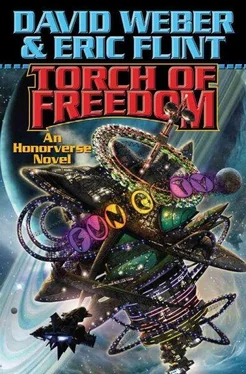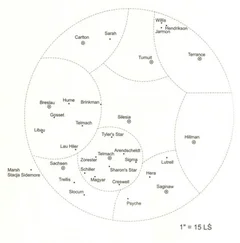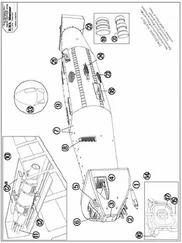The result was a working environment which avoided the impression of being shut up inside a bunker (despite the fact that it was) and simultaneously kept the researchers' mental and physical clocks adjusted to the rest of Mesa's clocks when they finally got to head home at the end of work each day.
Unfortunately, that wasn't enough to keep all of them focused and productive, McBryde reflected gloomily, and tapped the virtual keyboard key which selected the view of Herlander Simões' team, brought it to the center of his office's wall, and zoomed in on the hyper-physicist.
In some ways, Simões actually looked better than he had during his first conversation with McBryde, almost six T-months before. He was taking more care with his grooming, now, at least, and as far as McBryde could tell, he was actually getting more sleep. But the bouts of depression were still there. They seemed to be less frequent, yet, according to his therapist they were even deeper and darker than they had been, and McBryde himself had noticed over the last several weeks that Simões' occasional bursts of furious temper—which had never been a part of his amiable, easy-going personality before his daughter's death—had grown increasingly violent.
He hadn't—yet—approached the point of actually laying hands on any of his coworkers, but his red-faced, vicious outbursts, often laden with intensely personal profanity, had thoroughly alienated his coworkers. Many of them had been his and his wife's close friends before Francesca's death, and some of those seemed to be trying to maintain at least a degree of personal contact with him, yet even they had retreated behind a protective barrier of formality. The other members of his team, however, despite any sympathy they might have felt, avoided him whenever it was remotely possible. When they couldn't avoid him, they limited themselves to the minimum possible number of words. It was painfully obvious they'd written him off, and three of them were at the point of making it clear they didn't sympathize with him. The best McBryde could say about those three was that they'd at least tried to avoid expressing their agreement with the Board's decision in Francesca Simões' case where Herlander was likely to overhear them. On the other hand, he doubted any of them would be particularly heartbroken if he did happen to hear.
Their current project was nearing its conclusion, which was both good and bad. The improvement to the "streak drive" likely to result from their R&D would be a significant plus, of course. And the fact that Simões had remained basically functional throughout was a major plus, both personally and professionally, for Jack McBryde. But the unfortunate truth was that despite his past record, and despite his obvious ability, Herlander Simões wasn't really uniquely important to the Alignment's research efforts. He wasn't irreplaceable—not in the long term, whatever the disruptive effect on dropping him from his team's current projects might have been. And McBryde had no illusions about what was going to happen to Simões, at least as far as his work at the Center was concerned, as soon as those current projects were all safely put to bed.
They're going to shit-can him, that's what's going to happen , McBryde thought grimly. Hard to blame them, really. He's turned into such a basket case no one in his right mind would include him in a new team if they could find anyone at all to use instead. He sees it coming, too. I think that's one of the reasons his temper's been even shorter-fused lately. But what the hell is going to happen to him when he loses even his work?
He grimaced as a still darker thought crossed his mind once again. Given the fact that Simões was aware of the countdown until he was removed from his current duties, the possibility that his anger and despair might drive him to some self-destructive (and ultimately futile) overt attempt at vengeance loomed large on McBryde's list of Things to Worry About.
And what about you , Jack? He asked himself, gazing at the enlarged imagery of Herlander Simões working at his terminal, all alone in his self-created pocket of isolation. You're not the basket case he is . . . yet, at least. But you're infected, too, aren't you? And Zack's starting to worry about you, isn't he? He doesn't know what's eating on you, but he knows something's gnawing away down inside there .
McBryde leaned back in his chair, rubbing his closed eyes with the fingers of both hands, and a feeling of bleak despair flowed through him. There was more than a little anger in that despair, and much of that anger was directed at Herlander Simões. Intellectually, McBryde knew it was as irrational for him to be angry with Simões as it was for Simões to flash into a white-hot rage at some innocent remark from one of his coworkers. It wasn't as if the hyper-physicist had set out to destroy Jack McBryde's peace of mind. For that matter, Simões wasn't really even the one who'd done it. But what he had done was to become the factor which had crystallized McBryde's own . . . ambiguities into a grim self-admission.
As he'd watched Simões' centimeter-by-centimeter dissolution, what had happened to the hyper-physicist and his daughter had become a microcosm for all of his own doubts, all of his own concerns about the Mesan Alignment and its ultimate purposes. And that, McBryde thought, was because the Simões family's fate was a microcosm. Not even a Mesan alpha's mind could truly grasp—not on a fundamental, emotional level—the concept of centuries of time, of thousands of inhabited planets and literally uncounted trillions of human lives. The scale, the scope, was simply too huge. The mind retreated into the concept of "one, two, three, many"—a conceptualization which could be manipulated intellectually, factored into plans and strategies, but not truly grasped . Not inside, where a human being actually lived.
But Herlander, Harriet, and Francesca Simões represented a merely human-scale tragedy. It was one which could be grasped, could be understood. Something which could be experienced, at second hand, at least, and which, even worse, could not be ignored. Couldn't be labeled "Not My Business" and swept under a convenient mental carpet while one got on with one's own life.
Not by Jack McBryde, anyway.
And as he'd grappled with the emotionally draining task of keeping Herlander Simões functional long enough for him to complete his work, the new set of lenses his empathy with the hyper-physicist had given McBryde kept mercilessly examining what the Alignment had become. Deep at the heart of him, he knew, he was still committed to the Detweiler vision he'd assimilated as a youngster. He still believed the galaxy-wide rejection of the notion of genetically uplifting the entire human race to become all that it could have been was deeply, fundamentally, and tragically wrong. It rejected so much , turned its back on so many possibilities, doomed so many people to be so much less than they might have been. He believed that, with every fiber of his being.
But , he admitted to himself now, letting himself truly face it for the first time, what you don't believe anymore is that we have the right to force those who disagree with us to submit to our vision of their future. That's too much for you now, isn't it, Jack? And it's what the Board did to Francesca—and Herlander—that made it that way .
No, that wasn't entirely fair, he thought. It wasn't just the tragedy of the Simões family. It was a lot of things, including the realization of how many billions of people the Alignment's strategy was inevitably going to kill along the way—the "collateral damage" the Alignment's master strategy was prepared to accept.
Читать дальше












